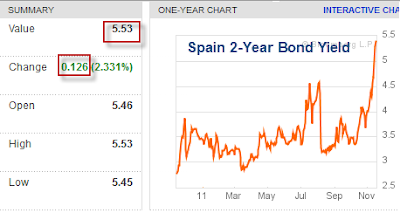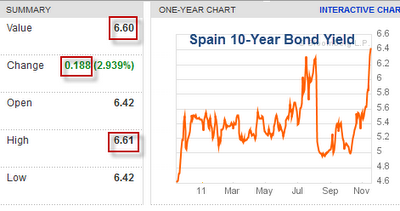Mish's Global Economic Trend Analysis |
- By Any Objective Measure, the Euro is a Failure
- LME Warehouses in US Overloaded with Copper, Zinc, Aluminum, Steel because of Economic Downturn
- IMF Downgrades Portugal GDP Outlook to -3.0%; Barclays Capital Cites Downside Risks
- Whack-a-Mole Euphoria Wears Off
- Official Denial Signals Spanish Bailout Imminent; Dreadful Result in Spanish Bond Auction, 6.975% Yield on 10-Year Debt; Merkel says "ECB Cannot Solve Euro Crisis"
- To Save the Euro we Must Destroy Germany
- Spanish 10-Year Bond Yield Hits Euro-Era Record 6.61%, 2-Year Yield Hits 5.53%; Italian 2-Year Yield Hits 6.54%, 10-Year Yield at 7.04%
| By Any Objective Measure, the Euro is a Failure Posted: 17 Nov 2011 07:29 PM PST Nigel Farage once again blasts Eurocrats in front of European Parliament, emphatically stating "By Any Objective Measure, The Euro is a Failure" Link if YouTube video does not play: http://www.youtube.com/watch?feature=player_embedded&v=bdob6QRLRJU#t=35s Farage also called various unelected EMU officials a "pack of hyenas". It is an entertaining video as well as the truth. Mike "Mish" Shedlock http://globaleconomicanalysis.blogspot.com Click Here To Scroll Thru My Recent Post List |
| LME Warehouses in US Overloaded with Copper, Zinc, Aluminum, Steel because of Economic Downturn Posted: 17 Nov 2011 11:41 AM PST Here is an interesting story from a reader about huge stockpiles of metals building up, right here in the US, because of limited demand from manufacturers. Dear Mish,LME Warehouses in US Overloaded with Metals Please consider Local warehouse space is bursting with stored metals Long-vacant New Orleans warehouses are bursting with metals such as copper, lead, aluminum and zinc as manufacturing slows down with the economy. The stockpiles that are accumulating are good news for owners of local warehouses, but the trend has touched off a rare scramble for specialized warehouses in certain parts of the metro area.Mike "Mish" Shedlock http://globaleconomicanalysis.blogspot.com Click Here To Scroll Thru My Recent Post List |
| IMF Downgrades Portugal GDP Outlook to -3.0%; Barclays Capital Cites Downside Risks Posted: 17 Nov 2011 10:45 AM PST The IMF is nearly always late and nearly always overly optimistic in its assessment of global growth. Today the IMF downgraded its forecast of Portugal, something that should have been obvious six months ago. Via Email (no link available) Barclays Capital offers these comments ... Portugal: 2nd IMF programme review revises down 2012 growth forecastsThe link Barclays referred to is Statement by the EC, ECB, and IMF on the Second Review Mission to Portugal All of Europe is degrading rapidly. Portugal will not come close to IMF growth estimates. Alternatively, Portugal will not come close to meeting IMF budget goals, most likely both. Mike "Mish" Shedlock http://globaleconomicanalysis.blogspot.com Click Here To Scroll Thru My Recent Post List |
| Whack-a-Mole Euphoria Wears Off Posted: 17 Nov 2011 10:05 AM PST On November 11, I commented on Whack-a-Mole Euphoria and 6-Sigma Events Hooray! The Borg Technocrats have saved us already, even though they have yet to lift a metallic finger.Gap Fills It took five trading days, but today the gap filled and the S&P sits at 1212.  Noty to worry, more euphoric moments are sure to be on the way. Mike "Mish" Shedlock http://globaleconomicanalysis.blogspot.com Click Here To Scroll Thru My Recent Post List |
| Posted: 17 Nov 2011 09:06 AM PST The ECB stepped into the fray once again today but the the results of the Spanish debt auction today speak for themselves. The rate on 10-year bonds is close to touching the 7% mark. The BBC reports on the "Dreadful Result" The Spanish government sold 3.56bn euros (£3.04bn; $4.79bn) worth of bonds out of a maximum target of 4bn euros.Volatility on Spanish Bonds Soars Bloomberg reports "Volatility on Spanish sovereign debt was the highest among developed-country markets today, according to measures of 10- year bonds, two-10-year spreads and credit-default swaps. The cumulative change was 5.1 times the 90-day average, the Bloomberg gauge showed" Official Denial Signals Spanish Bailout Imminent An official denial from a ranking Spanish government official suggests a bailout of Spain is now imminent. Spain is "absolutely not at risk of a bailout," Salgado said on Cadena Ser radio, after rates for the government to borrow money rose to dangerous levels.For a discussion of the "official denial" concept, please see Eurozone Breakup Logistics (Never Believe Anything Until It's Officially Denied) Systemic Nonsense In "Debt Crisis Live" The Telegraph reports Spain's finance minister Elena Salgado says there is a "systemic attack" on European sovereign debt going on, and that the ECB must keep on supporting government bonds by buying them until some other instrument is put in place. Clearly Salgado is talking systemic nonsense. Yields in Spain are approaching 7% for a simple reason: Spain cannot possibly pay back what is owed. The Telegraph also reports on huge protests in Italy and Greece:"We will throw all of them out," promised a banner held aloft by students, while another carried by anarchists read: "In the face of tyranny, one must choose between chains and arms." Here is a picture of a protest turned violent in Italy.  Merkel Rules Out Everything Here is a nice quote at the 10:45 mark from Debt Crisis Live. 10.45 Mrs Merkel has been speaking in Berlin this morning, and she seems to be ruling out everything. She said neither joint euro-area bonds nor using the European Central Bank will solve the debt crisis. Mike "Mish" Shedlock http://globaleconomicanalysis.blogspot.com Click Here To Scroll Thru My Recent Post List |
| To Save the Euro we Must Destroy Germany Posted: 17 Nov 2011 12:59 AM PST Yesterday German Chancellor Angela Merkel came flat out and said, "To save the Euro we must Destroy Germany". Well not exactly, but she may as well have because that is the implication. This is what she did say: Germany Is Ready to Cede Some Sovereignty to Save the Euro Chancellor Angela Merkel said that Germany is ready to cede some sovereignty to strengthen the euro area and restore confidence in the common currency.Not Merkel's Decision For starters Merkel is saying what she wants. It is debatable if that is what Germany wants at all. I rather doubt it. Moreover, even if it is what Germany wants, it is not Merkel's decision. Such decisions, as the German supreme court has ruled are up to voters of Germany, not politicians with an axe to grind about what they want. If German voters want to cede power and form a European nanny state, then so be it. But it will be the end of Germany and the end of Europe as well should they do so. Desperate Attempt to Save Something Not Worth Saving As the crisis lingers the cries for more intervention get louder and louder, even though the massive intervention to date has only made matters worse. Ambrose Evans-Pritchard highlights the cries for intervention in Latin showdown with Germany over ECB The EU's €440bn EFSF bail-out fund was supposed to take over on the rescue task, relieving the central bank. It has been a disastrous flop, unable to raise money itself at a viable cost after toying with leverage plans that greatly concentrate risk for creditor states. The net effect has been to accelerate contagion to the core.Euro Experiment is Over Pritchard concludes with a couple of paragraphs that I whole-heartedly endorse... David Heathcoat-Amory, Britain's former Europe minister, said Berlin will do whatever it takes to try to save EMU.Merkel is willing to destroy Germany (and Europe) to save something that is doomed anyway. Top Orwellian Comments Of All Times
We can safely add "To Save the Euro we Must Cede Sovereignty" to that list. Unlimited Supply of Hare-Brained Ideas There have been more hare-brained ideas in the last 6 months on how to save the Euro and the global economy than in the prior three years combined. Ceding sovereignty to save the unsavable is one of them. A leveraged EFSF is another hare-brained idea. It has already blown sky high. Here are some more examples.
Quack Ideas In regards to Beattie's proposal EuroIntelligence writes In the never-ending search for quack solutions to the eurozone crisis, European leaders come up with ever desperate attempts. After the silly idea of leveraging the EFSF, the G20 summit discussed – and failed to agree on – the notion of leveraging the EFSF through the IMF's special drawing rights (SDRs). Interventionists Man the Barricades In response to DeLong's proposal, my friend Pater Tenebrarum comments in Interventionists Are Manning The Barricades Another quite funny missive reaches us via the always amusing Keynesian statist Brad DeLong, who argues that given the euro area crisis escalation, the US Federal Reserve should immediately proceed to crank up its printing press. In terms of sheer lunacy his proposal is hard to beat. Currency Expiration Looniness"I believe that the ECB rate hike earlier this year will go down in history as a classic example of policy idiocy. We would probably still be in this mess even if the ECB hadn't raised rates, but the sheer stupidity of obsessing over inflation when the euro was obviously at risk boggles the mind." For sake of completeness, I need to point out once again Gregory Mankiw's inane proposal to save the economy by expiring 10% of Money supply every year (see Time For Mankiw To Resign) GDP Targeting Looniness I also need to point out the preposterous idea by Christina Romer who proposes the Fed institute GDP targeting in which she says Dear Ben: It's Time for Your Volcker Moment. For starters the Fed cannot spend money, it can only lend it. Thus the Fed has at best an indirect affect on GDP. Interest rates are at 0% and money is stacking up at the Fed as excess reserves. In such conditions, the Fed has no affect on GDP. However, the price of crude is back over $100. Food prices are up as well. The Fed has destroyed those on fixed income. The Fed already has a dual mandate. A dual mandate is stupid enough in and of itself. The reason is the Fed can control at most one variable at a time. For example, the Fed can defend an interest rate target but it then loses complete control over money supply. It can target money supply but lose control over interest rates. The Fed cannot do a damn thing about jobs other than indirectly. Now Romer appears to seek a triple mandate that is quite frankly economically impossible. How Economic Incompetents Rise to Fame and Power Inquiring minds may be asking "How the hell did such a blazingly incompetent economist ever get picked to Chair Obama's Council of Economic Advisers and why is she on Obama's Economic Recovery Advisory Board?" Those are excellent questions. The snide answer would be to place the blame on Obama. However, President Bush also had incompetent economic advisors. The answer is more fundamental. Romer was picked precisely because she was incompetent, not in spite of her incompetence. She says the things government wants to hear.
In short, Romer preaches exactly what presidents want to hear. Addendum: I added to my list above one of the biggest Orwellian statements in history: Nancy Pelosi said "We have to pass the health care bill to see what's in it." (YouTube Video) Mike "Mish" Shedlock http://globaleconomicanalysis.blogspot.com Click Here To Scroll Thru My Recent Post List |
| Posted: 17 Nov 2011 12:31 AM PST Yields on Italian and Spanish bonds are up once again, ahead of critical auctions for both countries. Italy 2-Year Government Bonds  http://www.bloomberg.com/apps/quote?ticker=GBTPGR2:IND Spain 2-Year Government Bonds  http://www.bloomberg.com/apps/quote?ticker=GSPG2YR:IND Spain 10-Year Government Bonds  Yield on the 10-Year Italian bond held above 7% up 3 basis points to 7.04%. Expect the ECB to step in once again if things get much worse. Note: I was able to get this format back on Bloomberg charts by deleting cookies and clearing cache. One other person experienced the problem I complained about in regards to an interactive map format and I tried his solution. It worked. Mike "Mish" Shedlock http://globaleconomicanalysis.blogspot.com Click Here To Scroll Thru My Recent Post List |
| You are subscribed to email updates from Mish's Global Economic Trend Analysis To stop receiving these emails, you may unsubscribe now. | Email delivery powered by Google |
| Google Inc., 20 West Kinzie, Chicago IL USA 60610 | |


No comments:
Post a Comment